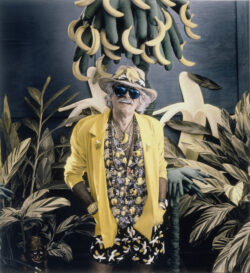Judy Cooper
Judy Cooper is a New Orleans photographer best known for her vivid portrait work.

Courtesy of Judy Cooper
Banana Man. Cooper, Judy (Photographer)
With series such as Women in Red, Twins, and New Orleans Sunday, New Orleans photographer Judy Cooper fills each frame with human subjects, posed and staring, usually with a smile, into the camera and, hence, at the viewer. Her talent as a portrait photographer lies in the selfhood she pulls from her subjects. Each person’s expression, clothing, posture, and background contribute to their totality within a photographic frame. “I want the viewer to recognize their common humanity with the people in my photographs,” she says.
“I’ve read Dante in the original,” says Cooper. This highly intelligent, unassuming woman forged, rather quietly, a daring life’s path from university French professor to fine arts photographer, primarily as a documentarian of New Orleans culture.
Born an only child in Memphis, Tennessee, in 1938, Cooper grew up in Birmingham, Alabama, where her father taught economics at the University of Alabama at Birmingham. She first arrived in New Orleans as an undergraduate in 1955, where she studied English at Newcomb College. She spent her junior year in Paris, France, and the experience was a profound influence upon her future.
“We had excellent classes in French civilization, literature, art, philosophy and history at the Sorbonne,” she said. “At that time, few people thought of photography as art, but it was becoming popular to document your travels with color slides.”
During a ten-year period in the 1960s and early 1970s, Cooper earned a master of arts degree in English from Columbia University and doctorates in both French and Italian literature from Tulane University. While teaching French at Loyola University in the early 1970s at Loyola, Cooper played tour guide to French photographer Jean Pierre Favreau as he photographed Louisiana. The experience sealed her resolve to pursue professional photography, and within months she left a scripted academic career path for the venturesome art world.
Cooper chose apprenticeship over art school, working with photographers Ron Todd and Alan Hess in New Orleans. Together they formed Muse, Inc., a company that photographed fine art for archival purposes and as a record of gallery installations, such as projects for artist Ida Kohlmeyer and Galerie Simonne Stern. “Probably our most interesting job,” Cooper said, “was to make prints from old glass plates made in the nineteenth century by an Ursuline nun, Mother St. Croix.” With this project, Cooper strengthened her relationship with the New Orleans Museum of Art, which commissioned prints of the plates to mount an exhibition. In 1998, Cooper joined the museum’s staff as its official photographer.
Cooper’s most recent project includes a series of portraits of the twenty-four distinguished female artists and founding members of A.I.R. (Artists in Residence) in New York, founded in 1972 to provide “a professional and permanent exhibition space for women artists to present work of quality and diversity … and [to] bring new understanding to old attitudes about women in the arts.”
Since 2006, Cooper has visited these artists, many elderly and in fragile health, tracking them down worldwide, from New York to Paris. Her feminist subjects include modern figurative artist Nancy Spero (1926–2009), abstract painter Judith Bernstein (b. 1942), and the gender-challenging realist Sylvia Sleigh (1916–2010).
Although in past years Cooper exhibited in New Orleans with the Still-Zinsel and Cole Pratt galleries, in recent years she shows exclusively with the women of A.I.R. She is a founding member of the New Orleans Photo Alliance and is a recipient of the Louisiana Division of the Arts Photography Fellowship. In 2008, the New Orleans Museum of Art hosted the solo exhibition Living Color: Photographs by Judy Cooper, which traveled to the LSU Museum of Art in Baton Rouge, the University Art Museum in Lafayette, and the Houston FotoFest.
